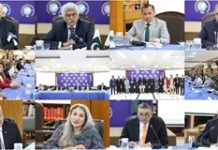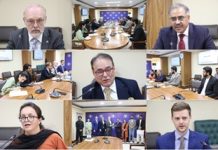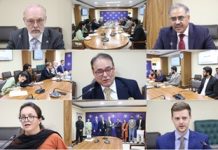Is failure of the talks a foregone conclusion?
Prime Minister Nawaz Sharif has once again asked the Pakistani Taliban to become part of the peace and political process. Coming at the heels of the recently concluded visit and meetings with the president and other government officials in the United States, and the trilateral meetings in London, at the sidelines of the 9th Islamic Economic Forum, between the Afghan President Hamid Karzai, the UK Prime Minister David Cameron and Prime Minister Nawaz Sharif on October 29, the call to the Taliban is not new. It has been over a month and a half since the All Parties Conference decided on September 9 to begin the negotiating process with the Pakistani Taliban.
What is new about the call by Nawaz Sharif is though the revelation that the man tasked to lead the negotiating process, the Interior Minister Ch Nisar Ali Khan, is reported to have now presumably done the requisite ‘homework’ in consultation with all the stakeholders.
While no time frame has been specified for these negotiations to begin, Ch Nisar has informed the nation of the basic points of his homework – i.e. coordination between the intelligence agencies will be improved and a joint intelligence directorate established; the upcoming National Internal Security Policy will bring structural changes in the security system; the National Counter Terrorism Authority (NACTA) would be revived as the major counter terrorism authority in the country and a Rapid Response Force shall be created.
All this homework has been done, according to Nisar, in order to ‘help the participants (in the negotiations) understand their responsibilities’. Among other measures that can be considered as part of the homework is the government’s decision to release Mullah Abdul Ghani Baradar, who while out of prison, still remains lost somewhere between Kabul and Peshawar.
And, almost as if on cue, the drone strikes by the US have abated, at least it seems, till the Nawaz government actually start formal talks with the Taliban.
Is there a method to the madness of negotiating with criminals, because that is what the Pakistani Taliban, or at least the TTP faction that the government will be engaging with are? Given that all kind of military action against these criminal elements has failed thus far, will negotiations fare any better with a bunch that has already been proved to have external supporters and financiers that would rather see Pakistan disappear from the face of the earth.
A common argument in favour of the talks has been that once the Americans start drawing down their forces in Afghanistan in 2014, the Taliban will have a large influence on the government and the future of Afghanistan. True. But then those will be the Afghan Taliban. The Pakistani Taliban or the TTP has solely dedicated itself to the destruction of the Pakistani state in its current form. It has nothing on its agenda that has to do with the future of peace and development in Afghanistan, nor for that matter in any of the tribal areas in Pakistan that they represent.
But then again, our leaders must do what the Americans tell them to do. And because it is in the interest of the Americans to have these elements onboard before they begin their drawdown so as to ensure a trouble free transit through Pakistan, then Pakistan must, even if it means dancing with the wolves in its own backyard.
But even as Nawaz Sharif says in London that talks with the Taliban are underway, the man that he has put in charge of leading the talks, Ch. Nisar, has already indicated that these might not bear any fruit if one was to read between the lines of his remarks published in the newspapers in the context of his having completed the homework for the talks.
Even as he underscored the measures to be put in place before the talks, Ch Nisar was clear in pointing out that the ‘society is facing degeneration and we as citizens are responsible for this situation’, and that the civil servants need to practice ‘taqwa’ and self-introspection, and questions whether they are willing to rise to the occasion.
What, one may ask, has this got to do with negotiating with the Taliban? Is this some sort of a preplanned excuse that will be thrown out if the negotiations fail? Will the failure be then laid to the fault of the degenerate society and the errant civil servants? Is failure of the talks a foregone conclusion and excuses need to be in place when this happens?
Views expressed are of the author and do not necessarily reflect the views of ISS or of the Government of Pakistan













